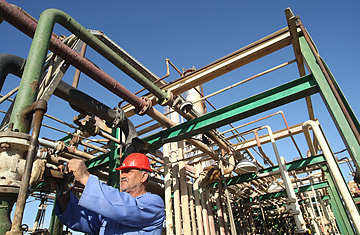
An Iraqi labourer works at an oil refinery in the southern town Nasiriyah on December 14, 2009.
Iraq has a dream: it wants to be bigger than Saudi Arabia. In seven years, Baghdad envisions itself overtaking its neighbor to the south as the world's largest petroleum producer. That means Baghdad must ramp up output from the current 2.4 million barrels per day to more than 12.5 million. To do that, it is seeking billions in investment from foreign oil companies — among them BP, the British company fighting to contain an oil spill in another gulf halfway across the globe.
To help promote the cause, the U.S. government organized a field trip last week to the deserts of southern Iraq, where the landmines of 20th century wars are being cleared and massive modern rigs are being brought in. This is the region that produces 80% of the country's oil. Major General Vincent Brooks, commander of U.S. forces in southern Iraq, towered over dozens of fellow visitors on a recent dusty morning in the Rumaila oil field in Iraq's oil capital Basra province. With U.S. Ambassador Christopher Hill nearby, Brooks chatted up the president of Iraq operations for BP. In November BP signed a contract along with Chinese partners to develop the field. Rumaila was first drilled by BP a half century ago, but the company, along with other foreign oil companies, was kicked out in the 1970s when Iraq nationalized its oil sector.
BP, like many major oil companies, has been providing training for free to Iraq since 2003. Now, with a contract signed to develop the country's largest field, the company has opened an office within the British consulate on the U.S. base in Basra and is preparing to open a full-fledged work camp at the Rumaila field itself.
Other companies who were on the field trip included Shell and Italy's Eni, as well as representatives of the British, Japanese, Italian and Dutch governments. The tour caught up with a rig in Rumaila as giant drill bits were being packed up, having days earlier hit the pay zone: oil untouched for millions of years ready to be brought to surface. Iraq boasts the world's third largest proven reserves, with many more to be found, if foreign oil companies pour in money.
As the U.S. continues its troop withdrawal, it is using its remaining days to ensure that Iraq's only cash crop maintains enough growth to help sustain the country. "Is it the only thing that's important? Of course not," said Hill. "They need infrastructure, they need electricity, they need agriculture. But this would give the country the means to deal with these other issues. That's why there should be this added focus on making sure this happens."
Oil earned Iraq $39 billion last year and $20 billion so far this year — 95% of state revenue. It is still not enough, however, to cover the country's basic budget needs. But it is the only real resource the country has to sell at the moment. "One should never talk about any one thing being the savior of anything," said U.S. Ambassador to Iraq Christopher Hill. But, he adds, "if you do the math, you can see [oil] is a complete game changer for Iraq in terms of its national income."
The Oil Ministry has just signed its 11th contract with international oil companies since November; the companies include BP, Shell, Eni, Exxon Mobil, Chinese National Petroleum Corp., and Russia's Gazprom. It is now getting ready to auction three natural gas fields to the highest bidder in September. All of this bolsters the need for improved security in a country still struggling to form a government after the disputed March elections. "There is a need for sufficient security so that economic development can take root. Once it does, it creates security" via jobs and added revenues, said Brooks.
There are numerous technical and political obstacles in the way. Recent closed door meetings on a U.S. base in Basra involving officials from foreign governments, oil firms and Iraqi state oil and private business companies highlighted issues such as inadequate entry points for massive oil industry cargo, inconsistent customs procedures, and the inability for non-Iraqi experts and laborers to get work visas. Meanwhile, OPEC members, led by rivals Saudi Arabia and Iran, will soon demand Iraq rejoin the quota system that helps the cartel manage the price of oil. Iraq has been absent from OPEC for 30 years due to wars and sanctions. At the same time, Iraqi nationalists are wary of too strong a foreign presence, and the possibility that the oil efforts will take funding away from other crucial sectors of the economy and social programs. There are estimates that more than $50 billion is needed to repair and expand the oil infrastructure to support the government's envisioned oil boom — money that could otherwise be used for electricity, housing, hospitals and sewage.
Nationalists are also wary that the oil blessing may also be a curse if the benefits do not trickle down to the people of Iraq. They point to Nigeria, where oil deals benefit everyone but the average citizen, foreign investment is sabotaged and workers kidnapped.
